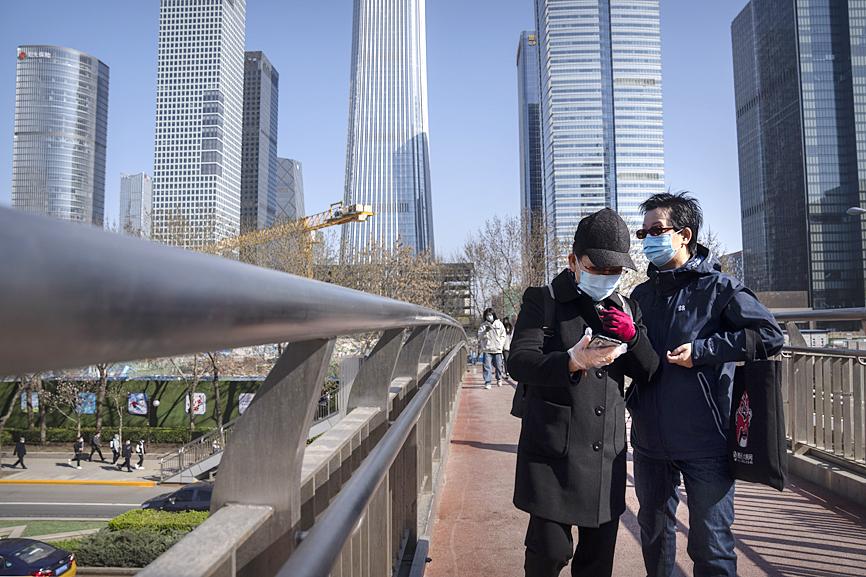More than half of the US multinational companies in China have reduced their annual revenue projections, mostly due to a COVID-19 outbreak in Shanghai, a joint survey by the American Chambers of Commerce in Shanghai and Beijing showed yesterday.
Responses to the survey — conducted with 167 companies operating throughout China, including 76 in manufacturing — found that 82 percent of manufacturers reported slowed or reduced production due to a lack of employees, inability to obtain supplies or Chinese government-ordered lockdowns.
Fifty-four percent of the firms have cut this year’s revenue projections following the outbreak, although 38 percent said it was too early to estimate the full effects, the survey said.

Photo: AP
Some manufacturers in Shanghai, particularly in the automotive industry, have resorted to operating with a “closed-loop,” wherein employees remain confined to the premises to keep production lines running, while outside suppliers are sealed off.
Such arrangements are acceptable for a few days, but “not sustainable” in the long term, American Chamber of Commerce in Shanghai president Eric Zheng said.
“Even if your employees are within the factory bubble, your trucks have to come and go sending inputs and outputs, but that’s not possible,” Zheng said. “I hope this is only a temporary, drastic measure to stop the spread.”
Shanghai for nearly a month has been battling its largest outbreak of COVID-19 and this week most of the city of 26 million people was put under lockdown as cases continued to sirge.
Authorities have implemented the lockdown in two phases, first targeting the eastern part of the city, followed by its western districts.
The chamber said that only half of the respondents were satisfied with China’s COVID-19 pandemic control efforts, while 77 percent had expressed dissatisfaction with the length of quarantines.
A growing number of local companies also said that the Shanghai lockdown is weighing on them, ranging from suspended operations and stagnant sales, to drying liquidity and delayed financial disclosures.
Shanghai-based power transmission equipment maker Sieyuan Electric Co (思源電氣) said that the pandemic has disrupted operations, logistics and raw material supplies, affecting its first quarter and full-year performance.

Intel Corp chief executive officer Lip-Bu Tan (陳立武) is expected to meet with Taiwanese suppliers next month in conjunction with the opening of the Computex Taipei trade show, supply chain sources said on Monday. The visit, the first for Tan to Taiwan since assuming his new post last month, would be aimed at enhancing Intel’s ties with suppliers in Taiwan as he attempts to help turn around the struggling US chipmaker, the sources said. Tan is to hold a banquet to celebrate Intel’s 40-year presence in Taiwan before Computex opens on May 20 and invite dozens of Taiwanese suppliers to exchange views

Application-specific integrated circuit designer Faraday Technology Corp (智原) yesterday said that although revenue this quarter would decline 30 percent from last quarter, it retained its full-year forecast of revenue growth of 100 percent. The company attributed the quarterly drop to a slowdown in customers’ production of chips using Faraday’s advanced packaging technology. The company is still confident about its revenue growth this year, given its strong “design-win” — or the projects it won to help customers design their chips, Faraday president Steve Wang (王國雍) told an online earnings conference. “The design-win this year is better than we expected. We believe we will win

Chizuko Kimura has become the first female sushi chef in the world to win a Michelin star, fulfilling a promise she made to her dying husband to continue his legacy. The 54-year-old Japanese chef regained the Michelin star her late husband, Shunei Kimura, won three years ago for their Sushi Shunei restaurant in Paris. For Shunei Kimura, the star was a dream come true. However, the joy was short-lived. He died from cancer just three months later in June 2022. He was 65. The following year, the restaurant in the heart of Montmartre lost its star rating. Chizuko Kimura insisted that the new star is still down

While China’s leaders use their economic and political might to fight US President Donald Trump’s trade war “to the end,” its army of social media soldiers are embarking on a more humorous campaign online. Trump’s tariff blitz has seen Washington and Beijing impose eye-watering duties on imports from the other, fanning a standoff between the economic superpowers that has sparked global recession fears and sent markets into a tailspin. Trump says his policy is a response to years of being “ripped off” by other countries and aims to bring manufacturing to the US, forcing companies to employ US workers. However, China’s online warriors